What Exactly Are Electrolytes and What Do They Do?
Clinical Dietitian Dana Eshelman breaks down the role electrolytes play in maintaining balance within the body.
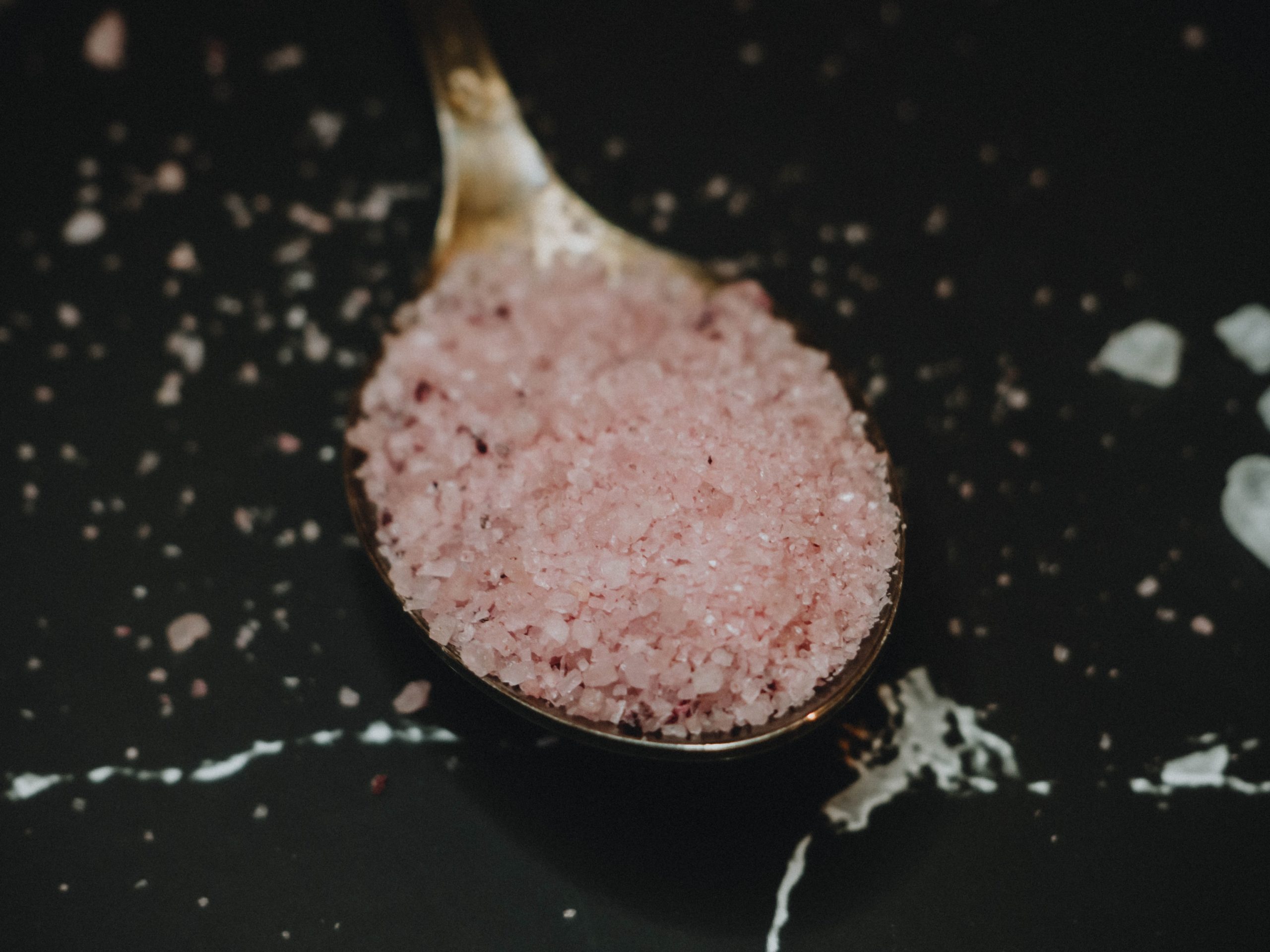
Electrolytes. It’s an essential ingredient needed to power athletes across finish lines. But what are they and what role do they play in keeping our muscular engines going?
Electrolytes is an umbrella term used to describe a combination of nutrients our body needs. Sodium, potassium, magnesium, calcium, chloride, phosphate and bicarbonate are the predominant components. They are the oil that keeps the engine humming by aiding in nutrient transportation, maintaining fluid balance, energy production, moving waste out of the cells and conducting nerve impulses so the muscles, heart and brain can work as they should.
It’s All About Balance
The balance of electrolytes ebbs and flows naturally throughout the day primarily through sweat loss and trips to the bathroom. Training and racing efforts increase the average sweat rate causing more to be lost during high intensity sessions. The key is to replenish those nutrients at a high enough rate to maintain that balance in the body. Prolonged deficiencies will disrupt the body’s fluid balance and pH level and you will feel the negative effects such as fatigue, periods of low-energy, headaches, and/or muscle cramps. Hence why we often see electrolyte sports drinks provided at most endurance races.
As you consider what to eat throughout the day, particularly on training days, here are my top tips on optimizing your electrolyte balance:
- Include whole food nutrition (most of the time). Whole food diets focus on plant foods and cut out added sugars and refined grains.
- Show the salt shaker some love. We have been taught to fear salt, but if you are taking action on tip one, then you need to befriend the salt shaker. Remember, whole foods have less sodium than processed, refined foods and as an athlete, your sodium needs are higher due to sweat losses. (Special circumstances, such high blood pressure, chronic conditions and cardiovascular disease may warrant a low-sodium diet (<2000 mg/day).)
- Add electrolytes. Supplementation of electrolytes is recommended for activity lasting greater than 60 minutes. Electrolyte needs will also increase with heat, humidity, altitude, alcohol intake or illness such as chronic diarrhea or vomiting.
- Don’t forget the carbohydrates. Among the many benefits carbohydrates provide for performance, they are also important for water retention and hydration.
- Pre-load your sodium. Adding a concentrated sodium drink (1500mg/L) the evening before and/or the hour before a training session or race taking place in heat, humidity, altitude and/or lasting more than two hours is effective at increasing plasma volume. That will optimize your hydration status and allow you to better regulate body temperature.
Meet your electrolytes
Below is a breakdown of electrolytes, their primary functions and what food sources are best for each.
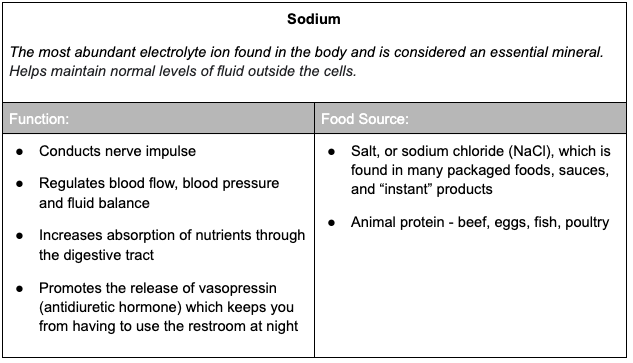
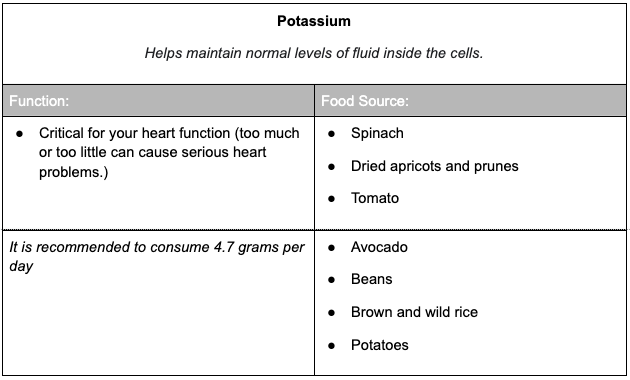
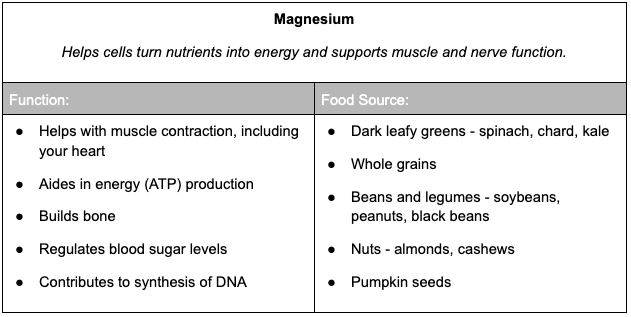
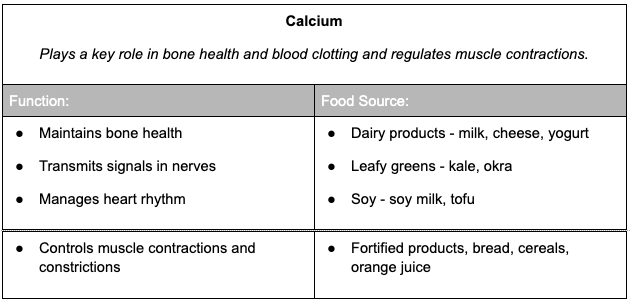
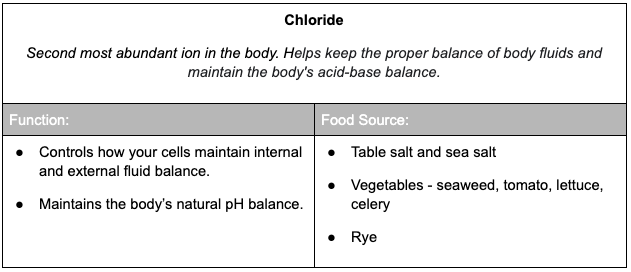
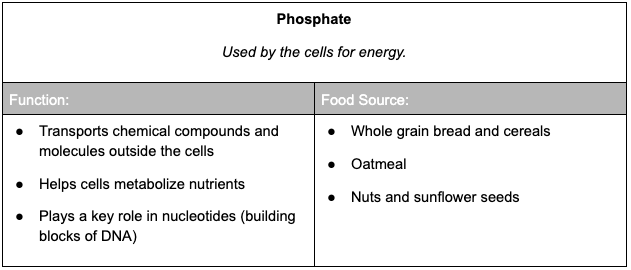
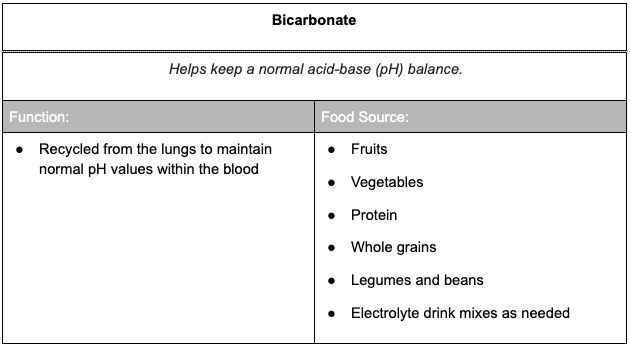
Scenarios to watch out for:
The following are things to keep in mind as you progress through your training to avoid injury or complications.
Overhydration
As I always tell my athletes, more of a good thing is not always better. Excessive water consumption can actually dilute your blood sodium levels causing a condition called hyponatremia, which is very dangerous. Mild cases of hyponatremia can cause muscle cramps and fatigue. As the concentration of sodium continues to drop one might experience confusion, seizures, brain damage and death in the most extreme cases.
Don’t mistake this as me telling you to cut back on hydration. It is important to rehydrate during and post training and replace sodium losses. (Just don’t over do it.) This will vary based on sweat and or sodium losses, daily activity level, body composition and weight. It may be useful to test your sweat rate through companies such as Levelen or Gatorade to determine your electrolyte and/or fluid losses so you can take the guessing out of your hydration game.
Low carbohydrate and keto diets
The low carbohydrate and keto diet is all the rage currently, but there are several concerns with this diet pattern, especially for endurance athletes. This diet avoids fruits, certain vegetables, beans, legumes and some high-sodium, refined foods, thus reducing or eliminating key electrolytes from your nutrition intake.
On this diet, the kidneys are signaled to release more sodium, resulting in symptoms of the “keto-flu” such as headaches, irritability, mood swings and fatigue.
Be aware of what essential electrolytes may be lacking if you follow this diet.
Dietary Deficiencies
I am all for whole food nutrition because they reduce inflammation and support body composition; however, this often also means lower sodium intake.
Whole foods are naturally lower in salt than refined and processed foods, which means you may need to adjust accordingly to meet your basic sodium needs. This is especially true if you are a long course athlete or someone that trains in hot, humid conditions.
…
Dana Eshelman MS, RDN is a performance dietitian that helps endurance athletes find hormone balance and optimize gut health through flexible nutrition so they can level up their performance. Dana is a multisport athlete and runner herself, and understands the demands of endurance training and competing. She strives to simplify nutrition for athletes, improve understanding of how to fuel and hydrate for training and competition, and enhance daily lifestyle habits for life-long success.
IG: @adashofdanardn

